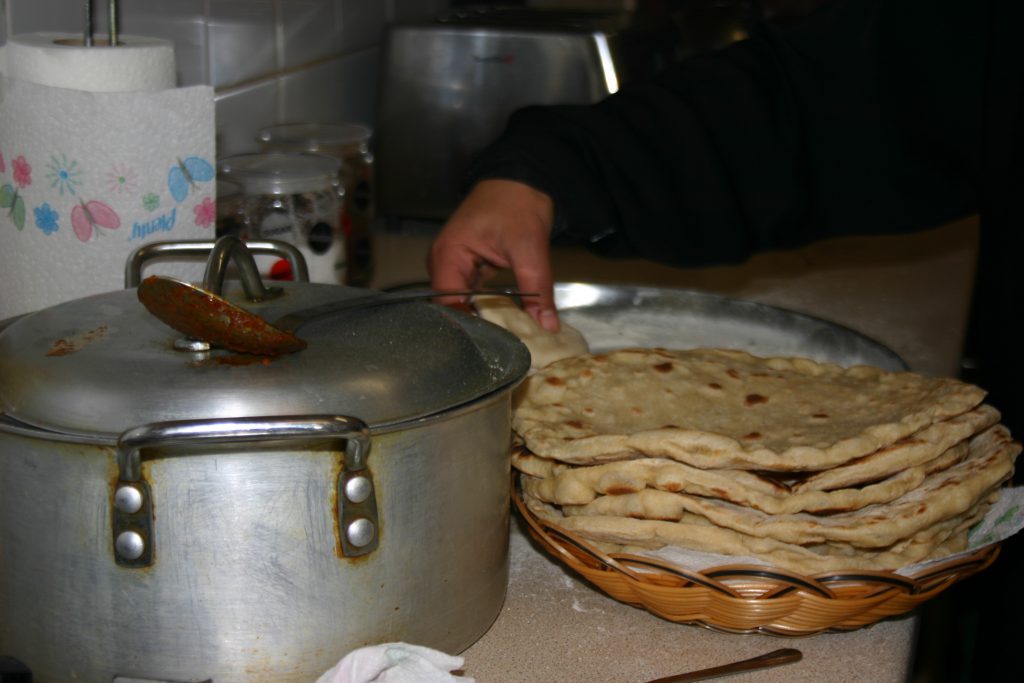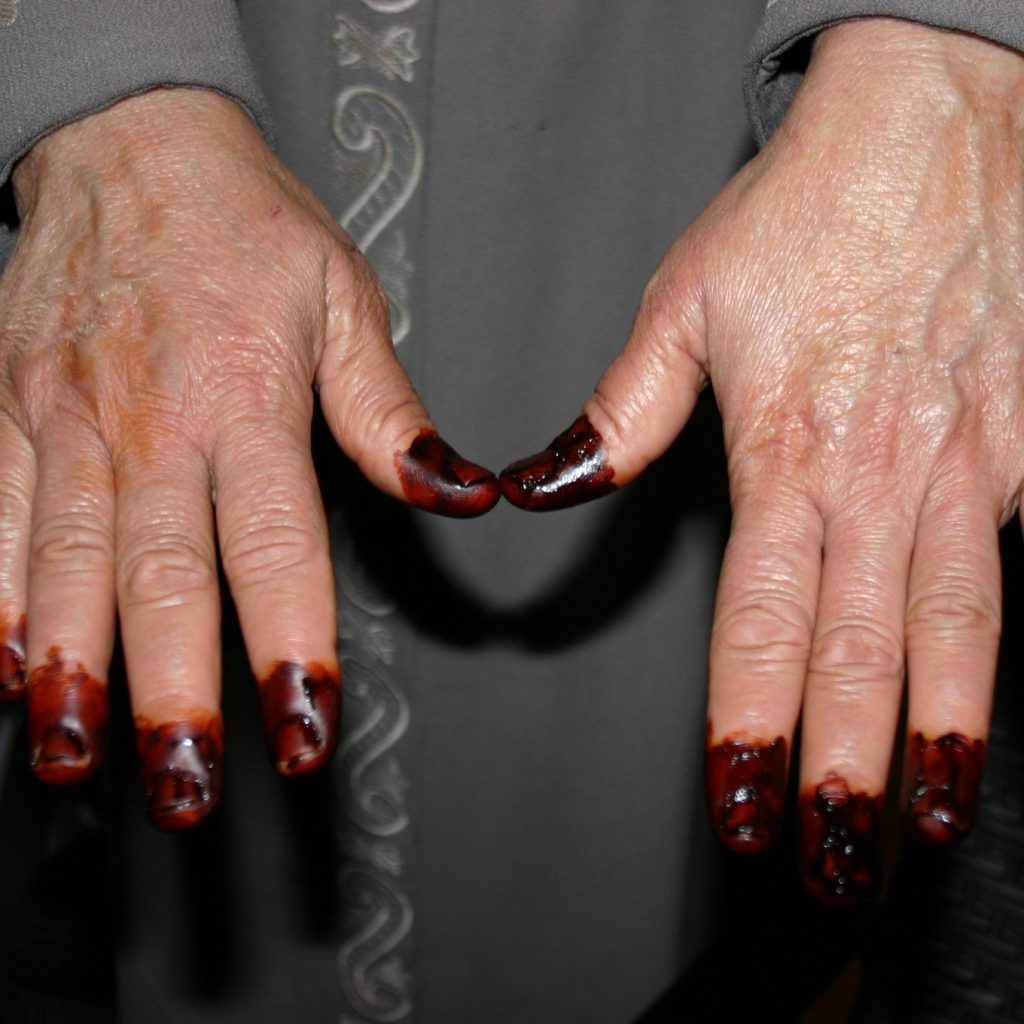It is said that the first mosque in Britain was built in Cardiff, Wales, set up by Yemeni sailors who arrived in the U.K. on coal-burning ships from the former British colony of Aden in the 19th century. Today it’s estimated there are between 70,000 and 80,000 Yemenis living in Britain, both recent arrivals and second and third generations. Many of them live in Eccles, a part of Greater Manchester in the north of England.
Lesley Sutton, a visual artist, spent months listening to the life stories and gaining the trust of the Yemeni community so that she could document the everyday lives of the women in their homes. What she discovered was a beautiful and intimate culture almost completely cut off from the world outside.
Women & Girls Hub: What was your impression of the Yemeni community in Britain?
Lesley Sutton: They are a completely separate culture within a culture. Although the Yemeni men have made significant contributions to the town of Eccles, among the women there is almost no integration. In Eccles (the area in Greater Manchester where the project took place), many of the Yemeni have settled into a number of streets in one neighborhood near the mosque. Something like two-thirds of the houses on some streets are lived in by Yemenis, so they have quite a ghetto going on. The local primary school is now something like 80 percent Yemeni.

Women & Girls Hub: How do the women’s lives differ from other communities in England?
Sutton: The women live very different lives. They have a very strong commitment to the home and family and caring for the growing community of Yemeni women, but almost nothing else. Some do not even drop their children off at school. They give their husbands shopping lists and the men go to the shops to buy the food, possibly because the women’s language skills are so weak. Most of them are financially poor in the U.K. context, but the beautiful thing is the relationship between generations. [The women] are so close and they really look out for one another. That’s something our culture doesn’t have anymore, and I grew to admire and covet something of the intimacy and companionship they shared.

Women & Girls Hub: How did you gain access to such a closed community?
Sutton: It was really hard. The men were very dominant and the women were initially wary of me. You’re not even allowed to take photos of women in Yemeni culture. Some of the older women I met actually believed a photo was taking a part of their soul. So there was a lot for me to learn before I could gain their trust and be able to paint an honest picture of their stories. I went along to community meetings and found out that some of the women were going to English classes, so I asked if I could help to teach English as a foreign language. I spent several months doing that, building friendships, until they slowly began to trust me. Eventually they started inviting me back to their homes with their husbands’ permission. By the end they were dressing me up in their clothes and doing my hair; they really accepted me and treated me very kindly.
Women & Girls Hub: What did you manage to photograph?
Sutton: At first I wasn’t even allowed to turn the camera on. I had to be really careful. After a while they would let me take photos of the men and the children. They dressed the children up in traditional clothes and let me take pictures of that. Eventually one family, the husband said I could photograph his wife’s hands while she was making bread. But I was never allowed to take anything of the women’s faces.

Women & Girls Hub: What was different once you saw them in their own context?
Sutton: The really amazing thing was seeing their wardrobes full of really fancy colors, high heels and fancy handbags. When they come to England they wear black abayas in public, but in their homes they wear what they want. Their hairdos were also really amazing, done in different braids and styles and their makeup is incredible. They have really beautiful eye makeup. Lots of the women also got out their gold and beautiful wedding outfits to show me. It’s common to use gold to pay for dowries in Yemen so many of the families have boxes of gold in their homes.

Women & Girls Hub: Were there differences between the older and the younger generations of women?
Sutton: What really surprised me was the younger women were the ones who were more hard-line and conservative. Some of the older women showed me pictures of how they dressed in Yemen in the 60s and 70s. They said they wore very colorful clothes and lived very differently in the villages in southern Yemen. When that happened the younger girls quickly corrected them, saying, “that was because you didn’t understand the true strength of Allah back then.” I was shocked because the younger girls felt strongly about this. They were much more likely to have what we would consider to be extreme views and many of them believed in Sharia law and in stoning of women if they commit adultery.

Women & Girls Hub: How did it make you feel having those conversations?
Sutton: It really shocked me. I didn’t have those conversations until I knew them well, and it was some of the women I clicked with who said it. I was really taken aback; I didn’t expect those harsh words coming out of the mouths of such gentle women. They were very much like myself in other senses; they were very loving and kind mothers who cared passionately about their families, but they were clearly also very fervent in their religious beliefs. However, I also grew to understand a little of why they were so fervent. They feared their children growing up to become “contaminated with our Western values,” which in their eyes were creating broken families and an over-sexualized culture that would be a threat to their intimate community cohesion.
Women & Girls Hub: Do you feel enough is going on to reach out to these women and help them integrate more in the community?
Sutton: There is a lot of that kind of work going on but it’s very hard. Salford University has been running art projects such as salt dough making and other craft activities in an attempt to get these women and others out of their houses with their children to learn English. But I think they are quite fearful of mixing with us. The men don’t want them to be part of the main community and they have everything they need provided by their own community organizations.
Women & Girls Hub: Are you still in touch with the women?
Sutton: Not really, just the odd message on WhatsApp. Once the project was finished, the men felt I didn’t need to have access to the community anymore. But I felt really privileged being welcomed as one of them. In a way it made me realize what we lack in our own families. We are so much more independent and we expect to have that independence from our families, but we don’t have that closeness, especially between generations.

